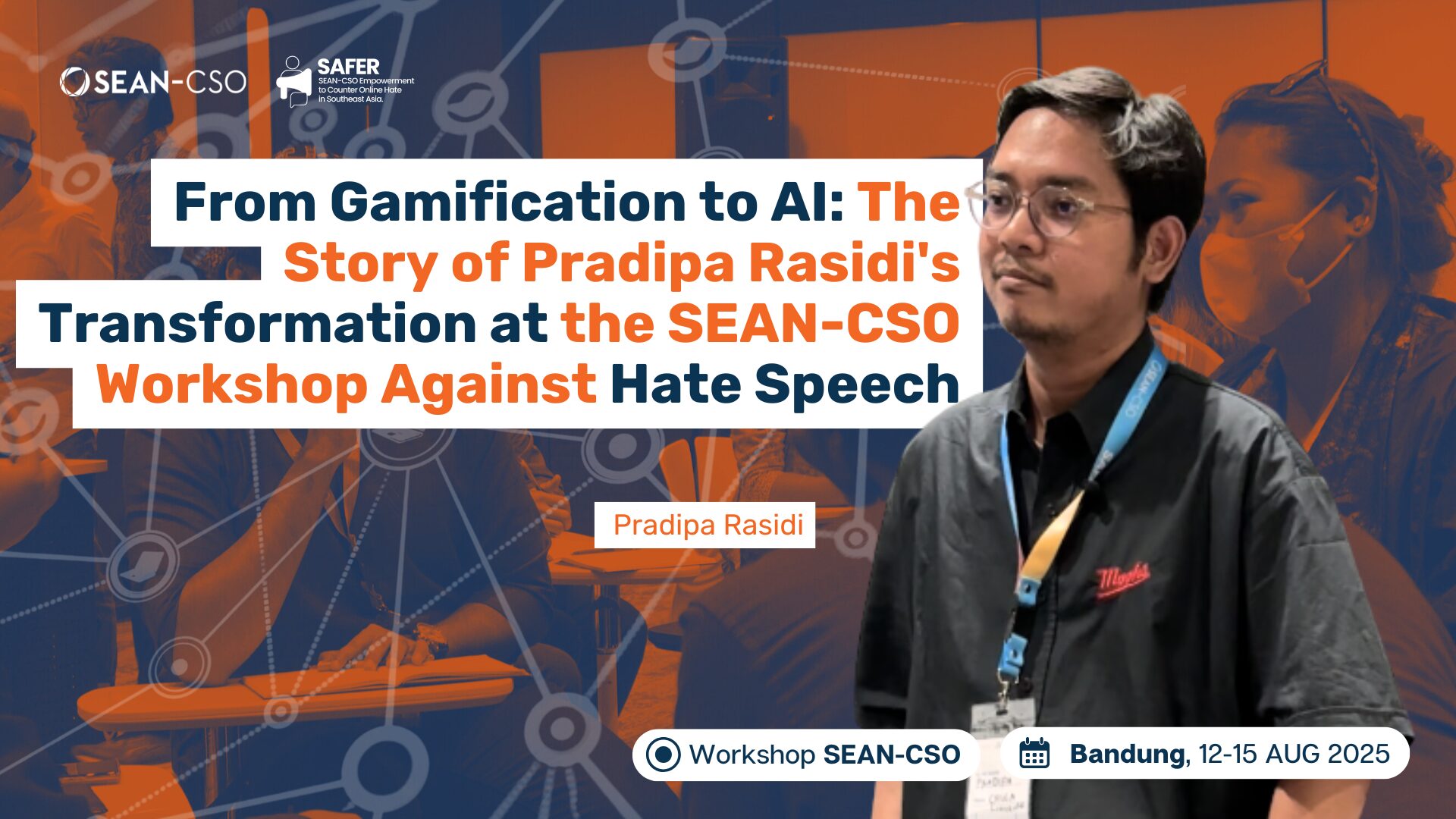The Ever-Changing Digital Battlefield
In the digital age, hate speech and violent extremism have found a new home in online spaces. Their massive and rapid spread poses a serious challenge to civil society across Southeast Asia. However, amid these challenges, peacebuilders are not standing idly by. They continue to seek innovative methods to counter these negative narratives.
This story comes from Pradipa Rasidi, a research consultant for Chulalongkorn University based in Jakarta. With a research focus on the buzzer, influencer, and gamification industries, Pradipa is at the forefront of understanding how narratives are formed and disseminated in the virtual world.
For four full days, Pradipa is a scholarship awardee that attended the SAFER Workshop organised by SEAN-CSO (Southeast Asian Network of CSOs) and facilitated by PeaceGeneration Indonesia. Held at the Deakin Lancaster Indonesia (DLI) Campus in Bandung, his experience attending the SAFER Workshop was a turning point, opening up new horizons and strengthening his belief in using technology for good.
Challenges on the Front Lines: Increasingly Sophisticated Enemies
Before attending the workshop, Pradipa had identified two main challenges in his fight against harmful content.
The first was obfuscation, or the technique of disguising content. ‘A lot of hate speech content is now disguised,’ explained Pradipa. Malicious actors deliberately use distorted words, combinations of letters and numbers, or even darkened videos to avoid platform moderation. This tactic makes automatic detection very difficult.
The second and more worrying challenge is the infiltration of extremist ideology into popular media. ‘It is so easy for extremist actors to use popular media such as games to instill extremist values and violence, not only in children, but especially in children,’ he said. This is an invisible battlefield, where narratives of hatred are subtly inserted through entertainment.
Turning Point: New Insights from the SEAN-CSO Workshop
The three-day SEAN-CSO workshop was a catalyst for Pradipa. There, he met experts and practitioners from various countries in Southeast Asia, sharing knowledge about technology, storytelling, and creative media. Two sessions in particular changed his perspective.
1. The Power of AI to Detect Hate Speech
The session that most caught Pradipa’s attention was on the use of Artificial Intelligence (AI) to detect and monitor hate speech. ‘This session expanded my knowledge of how generative AI can be used beyond the tools we are familiar with, such as ChatGPT,’ he said. This insight gave him an understanding that AI is not only a tool for creating content, but can also be a sophisticated ‘guardian’ capable of identifying subtle patterns of hatred, a direct answer to the challenge of obfuscation that he faces.
2. Gamification: A Powerful Weapon Yet to be Unleashed
As a game developer, the session on gamification felt like a homecoming for Pradipa. He saw tremendous potential in this approach. ‘Intervention methods like this, in my opinion, are still rarely used in Indonesia. The potential is enormous,’ he asserted.
This workshop reinforced his belief that games can be more than just entertainment. They can be designed as powerful intervention tools to teach empathy, critical thinking, and resilience against extremist narratives. The fact that this topic was explored in a collaborative forum such as the SEAN-CSO workshop was the main reason Pradipa joined.
Paradigm Shift: Convergence of Technology and Peacebuilding
The biggest change Pradipa has experienced is not the discovery of new tools, but a shift in mindset. This workshop highlights the importance of convergence between traditional peacebuilding processes and the use of digital technology.
“This is not entirely new to me, but it is very interesting to emphasize,” he said. He realizes that if extremist actors use technology ‘natively’ or naturally, then peacebuilders must do the same. “We as peacebuilders also need to engage in similar mediums.”
However, Pradipa also underlined the importance of a critical attitude. “We must remain vigilant about how digital technology and Big Tech’s ownership of these platforms can also perpetuate harmful content.” This awareness creates a balanced approach: fully embracing technology while understanding its risks.
Post-Workshop Action: The Rebirth of the Game ‘Taksa’
The transformation experienced by Pradipa did not stop at the idea stage. He had a clear action plan. He would continue developing his game called Taksa, a game designed to combat disinformation.
“This game discusses the structural aspects of why people engage with disinformation,” he explained. Currently, Taksa is still in the demo stage. Armed with the insights and network gained from the workshop, Pradipa is determined to develop this game into a full version and bring it to a wider audience. This is a tangible manifestation of how gamification can be used practically to build a more critical and peaceful society.
Conclusion: A Call for Collaboration and Innovation
Pradipa Rasidi’s story reflects a transformative journey. The SEAN-CSO workshop not only provided him with new technical tools such as AI utilization, but also strengthened his vision of the role of gamification in building peace.
His experience teaches us that the war against online hate speech cannot be won using conventional methods. Innovation, smart technology adoption, and most importantly, a collaborative space where peace advocates can learn from and inspire one another are essential. As Pradipa experienced, meeting people from across Southeast Asia working on the same issue from diverse perspectives is the greatest strength.
The journey has only just begun. With a spirit of collaboration and innovation, a safer and more peaceful digital space is not just a dream.
If you are interested in SEAN-CSO activities like Pradipa, follow our social media for more information: Instagram @sean.cso & X @sean_cso
SEAN-CSO provides a platform for civil society organisations in Southeast Asia to network and share resources. Through this network, members can support each other, share knowledge, and coordinate efforts to address the region’s social challenges. In doing so, SEAN-CSO contributes to strengthening the voice of civil society at both regional and international levels.



